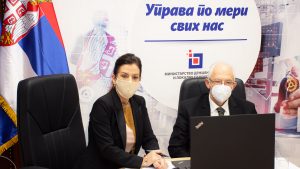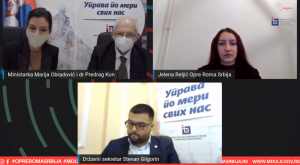
“For us as a state, it is extremely important that every citizen be vaccinated and that we reach every marginalized group in society. That is why today we organized an event like this, in order to discuss why a larger number of people in the Roma population did not join the vaccination, but also the others that are important for us to reach,” said Minister Marija Obradović tonight, on an online show titled “Can Serbia be immunized without the Roma community?” organized by MDULS and the civil movement Opra Roma Serbia.
She said that it is important to provide help together, enter the largest number of Roma settlements and make vaccination points there, adding that everyone who can help is important and should be included in this process, but warned that is also the responsibility of the Roma community to accept the hand of the state, of MDULS and the Ministry of Health, in order for the immunization to be performed.
MDULS State Secretary Stevan Gligorin pointed out that tonight’s show is a clear signal of the way our state treats this issue and how politically important it is today. He stated that it is important to respond to ambiguities and concerns among the Roma community, to respond to a sea of misinformation and dilemmas.
Dr. Predrag Kon, a member of the Crisis Staff, spoke about the phases and priorities of vaccination and pointed out that ethnicity did not affect the stage at which the Roma community will be vaccinated. He pointed out that the state needs the support of Roma leaders, mediators, and organizations to vaccinate the most endangered members of the Roma community in the first phases, that is, the oldest and the sick. Jelena Reljić, on behalf of the civic movement Opra Roma Serbia, presented a number of issues arising from the research conducted among the Roma population, which relate not only to the crisis caused by the Covid 19 pandemic but also to those related to the very existence and living conditions of the Roma people in Serbia.
 In the interactive dialogue that ensued, Minister Obradović reminded that MDULS, in cooperation with the Team for Social Inclusion and Poverty Reduction of the Government of Serbia, conducted a mapping of substandard Roma settlements during the pandemic and recorded 53 such settlements in Serbia, which either have no access to drinking water or have limited access to it. Therefore, MDULS initiated that local self-government units provide access to water in these settlements, and she personally insisted on the inclusion of coordinators for Roma issues in crisis headquarters at the local level. Additionally, Obradović assessed that these are small steps, but that it is important to start solving problems and raising awareness about them, to help solve the issue of basic unemployment, the issue of basic hygiene, but also to show how many educated Roma people there are in society. She also referred to the fact that MDULS, in cooperation with Opra Roma Serbia, subtitled the video on immunization, as well as that it would initiate the opening of checkpoints in Roma settlements, so that as many people as possible would apply for vaccination.
In the interactive dialogue that ensued, Minister Obradović reminded that MDULS, in cooperation with the Team for Social Inclusion and Poverty Reduction of the Government of Serbia, conducted a mapping of substandard Roma settlements during the pandemic and recorded 53 such settlements in Serbia, which either have no access to drinking water or have limited access to it. Therefore, MDULS initiated that local self-government units provide access to water in these settlements, and she personally insisted on the inclusion of coordinators for Roma issues in crisis headquarters at the local level. Additionally, Obradović assessed that these are small steps, but that it is important to start solving problems and raising awareness about them, to help solve the issue of basic unemployment, the issue of basic hygiene, but also to show how many educated Roma people there are in society. She also referred to the fact that MDULS, in cooperation with Opra Roma Serbia, subtitled the video on immunization, as well as that it would initiate the opening of checkpoints in Roma settlements, so that as many people as possible would apply for vaccination.
All participants in the show, which was broadcast on the Facebook pages of MDULS and the civic movement Opra Roma Serbia, and which was followed, at one time, by over 300 interested people from the country and the region, answered medical, but also logistical and political questions by +representatives of the Roma community.
 To sum up the discussion, MDULS State Secretary Stevan Gligorin concluded that it is only by fighting together can we overpower Covid 19, which is an issue for the whole country, and the Roma people are an important segment of society in that fight. He added that there will be challenges on that path, but if we cooperate and establish a dialogue, we can come out of it together as winners.
To sum up the discussion, MDULS State Secretary Stevan Gligorin concluded that it is only by fighting together can we overpower Covid 19, which is an issue for the whole country, and the Roma people are an important segment of society in that fight. He added that there will be challenges on that path, but if we cooperate and establish a dialogue, we can come out of it together as winners.
Minister Obradović also said that the next step is to help people in the field apply for vaccinations more easily, even those who do not have personal identification, to help and mediate this process as state administration, as well as to open a new way of cooperation and make progress and show that we can vaccinate Roma people, because it is the state’s job to help and take care of every citizen, regardless of their ethnicity.



